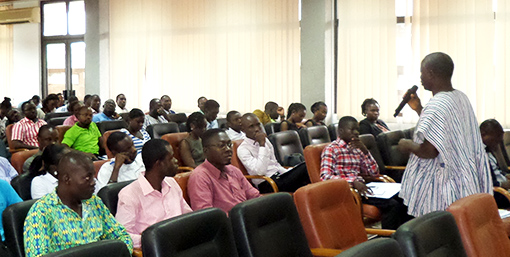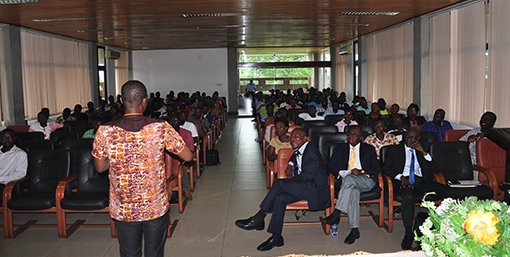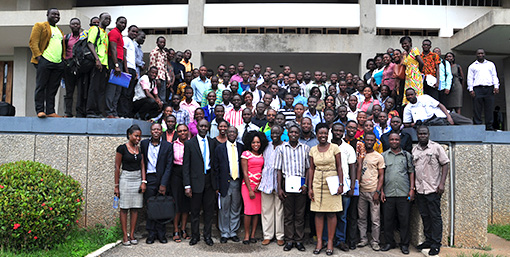As part of activities to strengthen the knowledge base of staff, researchers, and students of KNUST in proposal writing for research financial support, the Office of Grants and Research (OGR) organized a one-day workshop on Proposal Writing for Research Funds for Postgraduate Students. A total of one hundred and twenty (120) postgraduate students participated from the six Colleges of the university.
Facilitators for the training were: Prof. William Oduro (Dean, International Programmes Office), Prof. Imoro Braimah (Head, Department of Planning), Dr. Ellis Owusu Dabo (Director, KCCR) and Ms Nadia Tagoe (Grants and Research Manager, OGR)
Prof Peter Donkor opened the ceremony indicating that “the future belongs to the up and coming scientists therefore every effort must be made to encourage them to engage in ground breaking research which will ultimately serve as a panacea for the world’s numerous social, economic and health challenges”.
Prof. C. K, Kankam (Dean, Graduate School) who was present also gave an opening remark indicating the importance of the training and shared the need to include proposal writing in the curriculum for post graduate students.

Prof Braimah took students through the development of literature review, research problem, research questions and objectives, proposed research procedure, justification, logical framework matrix and bibliography as the main components of a research proposal. Having a good basis for proposal writing, Prof Oduro enlightened participants on “Work Plan and Budgeting”, where he stressed the need to develop SMART (Specific, Measurable Achievable, Relevant and Time Bound) Work Plans. He noted that “if 10% of students in KNUST could get funding to support their research, it would positively advance research conducted at KNUST.”
Dr Owusu-Dabo on the other hand threw light on Reviewers Expectations as far as grant applications are concerned. He advised students to observe application guidelines strictly and avoid the use of jargons in their research. He recommended that supervisors be consulted in forming research topics and writing proposals to help them get a broad overview even before they start actual work.
Ms Tagoe also exposed students to the array of funding opportunities around them. She enumerated numerous sources of funds and funding opportunity announcements specifically for postgraduate students. She expatiated on application modes for funding, available funding and pointed out some databases and opportunities that could be assessed.

To crown the presentations, Dr Edmund Ekuadzi of the Department of Pharmacognosy shared his personal experience with the participants. He said that his experience begun with his first interaction with the subject of proposal writing which was organized by the Ghana-Michigan Charter Project at Elmina in 2010.With the help of his supervisor, he applied for a fellowship opportunity to support his PhD research. His application was successful and he was awarded a three month fellowship in Novartis in Base, Switzerland. He shared the benefits he gained from that fellowship and its contribution to his research as well as his professional and social growth. He concluded by urging the participants to take the bold step to apply for funding opportunities.

